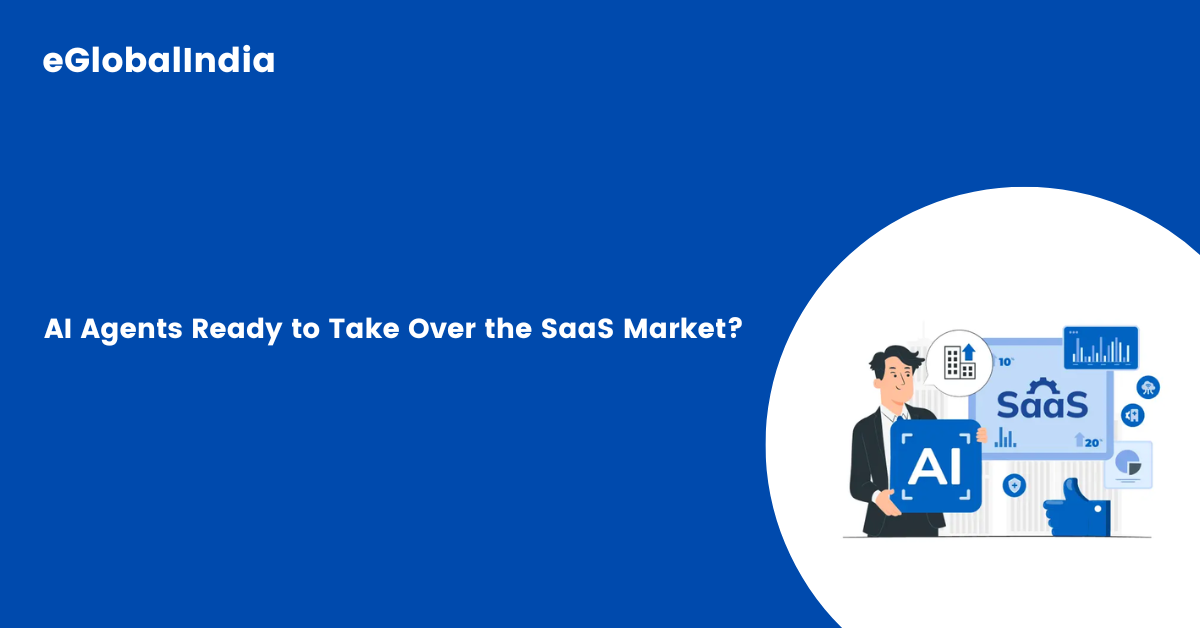

The Software as a Service (SaaS) industry has experienced tremendous growth in recent years, transforming the way businesses access and use software.
From customer relationship management (CRM) platforms to project management tools, SaaS has become an essential part of the modern business landscape. As with all technological advancements, the next major shift is already underway—artificial intelligence (AI) agents.
These AI-powered systems are set to revolutionize the SaaS market by enhancing efficiency, automating processes, personalizing user experiences, and improving decision-making capabilities. The question now is not whether AI agents will dominate the SaaS industry, but how they will do so, and what impact this will have on businesses, developers, and end-users alike.
This article delves into the growing role of AI in the SaaS sector, exploring how AI agents are transforming various industries. It also assesses whether these agents are truly ready to take over the SaaS market and examines the potential benefits they bring, such as cost savings, scalability, and increased productivity.
Along with these opportunities, we will also address the challenges associated with implementing AI within SaaS platforms, including concerns about data privacy, integration complexities, and ethical issues. As AI-driven automation continues to advance, businesses must consider how to effectively integrate these technologies into their operations while mitigating potential risks. Ultimately, the rise of AI agents presents both exciting possibilities and significant challenges for the future of SaaS.
To comprehend the role of AI agents in the SaaS industry, it’s essential to first understand what AI in SaaS entails. AI in SaaS refers to the integration of artificial intelligence technologies into cloud-based software solutions. These technologies, including machine learning (ML), natural language processing (NLP), predictive analytics, and automation, are designed to enhance the intelligence and functionality of SaaS applications, improving efficiency and user experience.
AI agents have evolved significantly within the SaaS (Software as a Service) market. While their use was initially limited to specific tasks, AI’s role in SaaS platforms has expanded dramatically over the years. Initially, AI was applied mainly for simple automation of routine tasks, such as data analysis, customer support, and sales forecasting. Early SaaS applications like CRM tools, for example, Salesforce, used AI to predict customer behavior and identify potential leads. These early AI-driven functions set the stage for further advancements in the field.
As AI technology progressed, we saw the emergence of AI-powered assistants within SaaS platforms. These assistants took on more complex tasks, such as helping with customer support, generating leads, and even creating content. By automating these processes, AI assistants not only reduced the workload for human teams but also enhanced the overall user experience, providing more efficient solutions for businesses and their customers.
Fast forward to today, AI agents have become far more sophisticated. These self-learning systems can now perform complex tasks with minimal human intervention. AI agents are capable of analyzing vast amounts of data, making strategic decisions, and operating across various business functions. From managing customer interactions to optimizing sales processes and streamlining HR functions, AI agents are capable of performing end-to-end operations that once required human input at every step.
AI agents are making a significant impact across several key sectors of the SaaS market, including customer service, sales, marketing, human resources (HR), and operations. Let’s take a closer look at each of these sectors:
AI-powered chatbots and virtual assistants have revolutionized customer support in SaaS. These AI agents can handle an increasing number of customer inquiries, solve common issues, and provide personalized assistance at any time of day. They use NLP to understand customer queries and provide relevant solutions, helping businesses scale their customer service without the need for a large team.
Sales teams are increasingly relying on AI agents to optimize lead generation, manage pipelines, and personalize outreach efforts. AI tools leverage customer data to pinpoint the most promising leads, forecast buying behavior, and recommend the most effective strategies for engagement.
AI is playing an important role in automating and optimizing marketing efforts. From predictive analytics to content personalization, AI agents help businesses target the right audience, measure campaign success, and optimize marketing strategies in real-time.
In HR, AI agents are automating the recruitment process, screening resumes, and identifying top candidates based on predefined criteria. They can also help with employee engagement, performance management, and workforce optimization.
The integration of AI agents in the SaaS market provides several key benefits for businesses, developers, and consumers alike. These benefits range from improving efficiency to enabling growth without significant increases in resources. Let’s dive into the advantages of adopting AI agents in SaaS.
AI agents excel at automating repetitive tasks, allowing businesses to streamline operations and focus on more strategic objectives. By automating routine processes such as data entry, customer inquiries, and scheduling, AI reduces manual effort and enhances overall workflow efficiency. In both front-end and back-end operations, AI agents can handle large volumes of tasks swiftly, ensuring businesses stay productive without overburdening staff.
One of the standout features of AI agents is their ability to process and analyze vast amounts of data. This enables them to offer personalized experiences across various SaaS applications. For instance, in customer support, AI-driven tools can recommend solutions based on a customer’s previous interactions, offering tailored assistance. In marketing, AI tools can personalize content to fit individual user preferences, helping businesses engage their audience more effectively and improve customer satisfaction.
By automating several functions, AI agents can help businesses reduce operational costs. With AI handling tasks like customer support, lead generation, and data processing, businesses can eliminate the need for large teams dedicated to these functions. This frees up resources that can be redirected toward innovation and growth. The cost efficiency that comes with AI integration allows businesses to operate leaner while still maintaining high service quality.
AI agents make it easier for businesses to scale without the need to significantly expand their workforce. Since AI can manage routine tasks, SaaS businesses can handle a growing number of customers or clients while maintaining high performance. AI systems are built to scale effortlessly, allowing businesses to grow without losing efficiency, making them more competitive in the market.
While AI offers many advantages, there are also challenges and risks associated with its implementation in SaaS platforms. These include:
AI systems rely heavily on data to learn and make decisions. However, this also raises concerns about data privacy and security, especially when handling sensitive customer information. SaaS companies must implement robust security protocols to protect customer data and comply with regulations like GDPR.
Integrating AI into existing SaaS platforms can be complex and costly. Many businesses face difficulties when trying to implement AI solutions,
especially if their current infrastructure is outdated or incompatible with AI technologies.
AI algorithms can inadvertently perpetuate bias, especially if the training data contains inherent biases. This is a critical concern in areas such as hiring and customer service. Businesses must ensure their AI models are trained with diverse and unbiased datasets to avoid reinforcing inequalities.
AI agents are only as good as the data they are trained on. Poor-quality or incomplete data can lead to inaccurate predictions and decision-making, which can harm the business.
As AI technology continues to evolve, we can expect even greater advancements in the SaaS sector. The next phase of AI agents in SaaS will likely involve greater automation, more sophisticated decision-making capabilities, and improved natural language processing.
In the coming years, we may also see the rise of fully autonomous AI systems that can independently manage business functions, from sales to customer service to HR.
Here are 6-7 human-written FAQs you can include for the topic “AI Agents Ready to Take Over the SaaS Market”:
A: AI agents are autonomous software systems that can perform tasks, make decisions, and improve over time through machine learning. In the SaaS market, AI agents can enhance user experience, automate tasks, and provide personalized solutions, making SaaS platforms more efficient and effective.
A: AI agents can handle customer inquiries around the clock, offering instant responses and solutions to common problems. This reduces the need for human intervention, speeds up response times, and improves customer satisfaction.
A: AI agents are designed to augment human capabilities, not replace them. While they can automate repetitive tasks, human employees will still play a critical role in managing complex issues, decision-making, and maintaining customer relationships.
A: AI agents provide faster decision-making, 24/7 support, data-driven insights, enhanced personalization, and operational cost reduction. They also allow SaaS companies to scale efficiently by automating routine tasks.
A: Yes, AI agents can automate processes such as onboarding, customer support, and data analysis, which helps SaaS businesses manage larger customer bases without increasing overhead or human resources.
A: When properly implemented, AI agents can enhance security by monitoring unusual activities, detecting potential breaches, and ensuring that data privacy standards are upheld. However, it is crucial to ensure that AI systems are regularly updated to stay ahead of security threats.
A: The future of AI in SaaS is promising, with continuous advancements expected in areas such as
predictive analytics, natural language processing, and intelligent automation. These innovations will make SaaS solutions smarter, more adaptive, and capable of providing even more personalized services to customers.
AI agents are set to significantly transform the SaaS market, offering key advantages like improved efficiency, cost savings, personalization, and scalability. These intelligent systems can automate tasks such as customer support and data analysis, allowing businesses to operate more effectively. AI’s ability to provide personalized experiences and anticipate customer needs is a game changer, enabling SaaS platforms to stay ahead of the curve and continuously innovate.
As AI technology evolves, its role in SaaS is expected to grow. With AI agents taking over routine tasks, businesses can scale more easily without adding excessive overhead. These agents also offer 24/7 support and can learn and adapt over time, enhancing user experiences and helping companies stay competitive. By harnessing the power of AI, SaaS platforms will be able to deliver smarter solutions tailored to individual customer needs.
However, for AI to truly reach its full potential in the SaaS space, there are challenges to address. Issues like data privacy, security concerns, and the ethical use of AI must be carefully considered to ensure trust and transparency. Furthermore, integrating AI into existing platforms could require substantial investments in infrastructure and expertise.
Despite these challenges, the future of AI in the SaaS industry looks bright. As businesses continue to adopt AI-driven solutions, we can expect even more transformative changes, with AI agents playing a crucial role in the evolution of the industry.
With the right focus on ethical practices and smart integration, AI is poised to redefine how SaaS platforms operate and interact with customers in the years to come.
Want to know more about AI in SaaS? Contact us!

Apr 28, 2025

Apr 26, 2025

Apr 25, 2025

© 2017 All rights reserved.